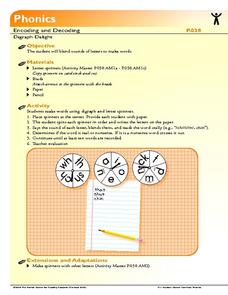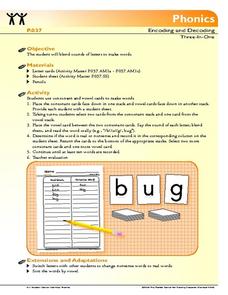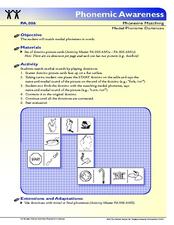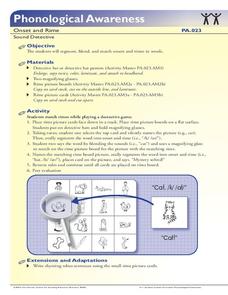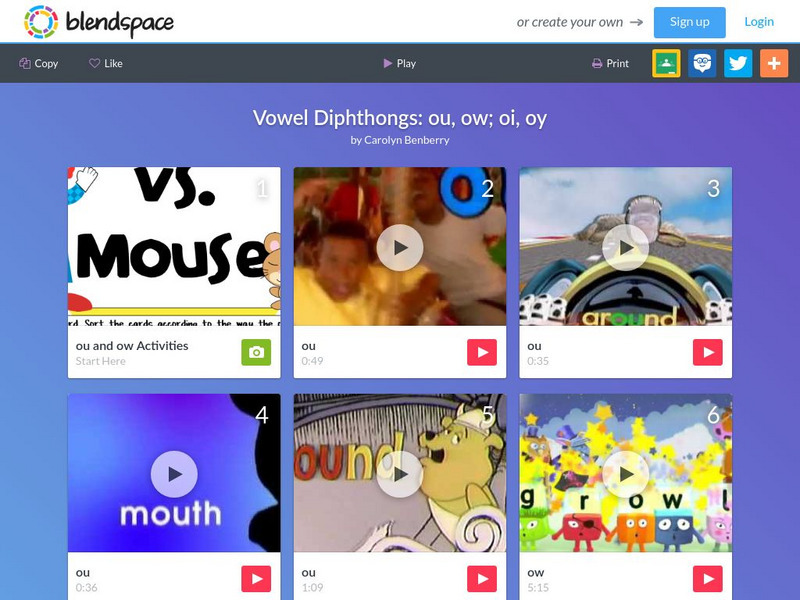Florida Center for Reading Research
Word Steps
Blending basic CVC letters to make words is one of the first steps to independent reading. Provided here are several images of stairs and several letters to cut and arrange. The learner rearranges the letters to form CVC patterns, sounds...
Florida Center for Reading Research
Phoneme Split and Say
Little ones are provided with all the tools needed to begin segmenting phonemes. There are twenty Elkonin box picture cards, five blank Elkonin box cards, and full instructions on how to help pre-readers practice splitting and saying...
Florida Center for Reading Research
Word Blender
Little learners will love being able to blend sounds together to make words. This game provides eight onsets and eight rimes that can be used to mix and match to sound out words. This activity is to be completed in pairs and is a great...
Curated OER
Vowel Sound: ie
Introduce young learners to the various letter sets that make the /ie/ sound. They assess 12 different words, then sort them based on their medial letter pattern. Letter sets focused on are, ie, i_e, igh, and y. An answer sheet is included.
Florida Center for Reading Research
Phonics: Encoding and Decoding, A Digraph A Word
Learners view a series of images, then choose digraphs, consonants, and vowels to spell out the object's name on each card.
Florida Center for Reading Research
Phonics: Encoding and Decoding, Make-A-Word
Little learners place a picture card on a magnetic board, say the name of the object on the card, then sift through alphabet magnets to find and spell the word they said.
Florida Center for Reading Research
Phonics: Encoding and Decoding, Digraph Delight
There are three spinners to use in this phonic activity. Spinner one contains digraphs, spinner two contains vowels, and spinner three contains consonants. Learners spin each spinner, write down the letters they get, blend them to make a...
Florida Center for Reading Research
Phonological Awareness: Phoneme Blending, What's My Word?
At a listening station, learners listen to a pre-recorded script; they follow the directions and number each picture on their picture chart corresponding to the segmented phonemes they hear.
Florida Center for Reading Research
Phonics: Encoding and Decoding, Three-In-One
Scholars use the provided pack of alphabet cards to construct basic CVC words, then write down each word they make in one of two columns. Column one is for real words and column two is for nonsense words.
Florida Center for Reading Research
Phonics: Onset and Rime, Say It Now
Pairs use onset and rime cards to make as many words as possible by blending the onsets with the rimes.
Florida Center for Reading Research
Phonics: Encoding and Decoding, Vowel Stars
Learners are given a star; each star contains a c_c form in the center and vowels on each point. They use the vowels to fill in the blank between the consonants making a simple CVC word. They write each word they make on a piece of paper.
Florida Center for Reading Research
Phonological Awareness: Phoneme Matching, Medial Phoneme Dominoes
Matching medial phonemes can be as easy as playing a game of dominoes! These dominoes contain pictures of items children can say. As they say each word aloud, they work to match the medial sound to one on an adjacent card. Just like real...
Florida Center for Reading Research
Phonological Awareness: Onset and Rime, Sound Detective
Play letter sound detective with your class, and snoop out sounds, onsets, blends, and rhyme. In pairs, children take turns choosing a card from the pile; as they sound out part of the word, their partner attempts to figure out which...
Pyro Innovations
Phonemic Awareness
What was the sound that letter made? The letter S is the phoneme of today's lesson and it is ready to make an appearance. Little ones discuss the sound S makes, then they hold up S cards every time they hear words containing the initial...
Curated OER
Phonics: Decode and Write Words with Blends
Kids see, say, then count the phonemes they hear in a series of simple words. They practice counting phonemes with the teacher, then sound out the same word on their own. As they count each phoneme they write it down on their paper. A...
Curated OER
Phonemic Awareness: Phoneme Blending
This resource is more of a suggestion than a full lesson. It explains how young pre-readers can work with their teacher to practice blending phonemes to make words. The class watches the teacher as she says and orally segments a word...
Curated OER
BL to the Ends (blends)
Students examine word blends. For this word blends lesson, students investigate common word blends. Working in pairs, students analyze words containing blends and generate a word list.
Curated OER
Letter Sound and Letter Combination Accuracy, Sound Search Game
Students participate in an activity to identify words with specific letter sounds or letter combinations. In this letter sound/letter combination lesson, students focus on three-letter sounds then identify words in a sound hunt involving...
Free Reading
Free Reading: Letter Hunt Tally: A Letter Sound Accuracy Game
Students play detective and discover a given letter at the beginning of a word. They keep a "tally" sheet and compete with their classmates. This site includes links to Letter cards and a Letter Hunt Tally Sheet.
Free Reading
Free Reading: Bl to the Ends (Blends) Game
This activity introduces letter blends both with index cards/flashcards and reenforcement with students highlighting the blends on individual word lists.
Other
Alphabet Sound Recognition With Motions
A fun activity for kinesthetic learners! Students learn motions to go along with letter sounds. This site includes a link to a building fluency site.
Free Reading
Free Reading: Word Race Game: Letter Sound Fluency
An exciting classroom word game based on the game "Boggle." The classroom is divided into groups. The teacher says a letter, and each students writes down as many words as they can that begin with that letter. Then they compare with the...
TES Global
Blendspace: Vowel Diphthongs: Ou,ow; Oi, Oy
A seventeen-part learning module with links to images and videos to help students learn about ou/ow and oi/oy diphthongs.








